Law of Tort: Informed Consent, Bolam Test, Montgomery Case Analysis
VerifiedAdded on 2023/06/01
|12
|2772
|339
Report
AI Summary
This report delves into the legal concept of informed consent within the framework of Tort Law, examining the duties and responsibilities of medical practitioners. It explores the significance of informed consent in upholding patient autonomy, emphasizing the ethical and legal obligations of doctors to disclose relevant health information to patients, allowing them to make informed decisions about their treatment. The report analyzes the Bolam test, a legal precedent used to determine medical negligence, and the landmark case of Montgomery v Lanarkshire Health Board, which significantly reshaped the understanding of informed consent. Furthermore, it discusses the exceptions to informed consent, such as therapeutic privilege, where withholding information may be justified to protect the patient's well-being. The report provides a comprehensive overview of the legal principles and case law surrounding informed consent, highlighting the evolving standards of care and the balance between medical expertise and patient rights. This assignment, contributed by a student, is available on Desklib, a platform offering AI-based study tools.
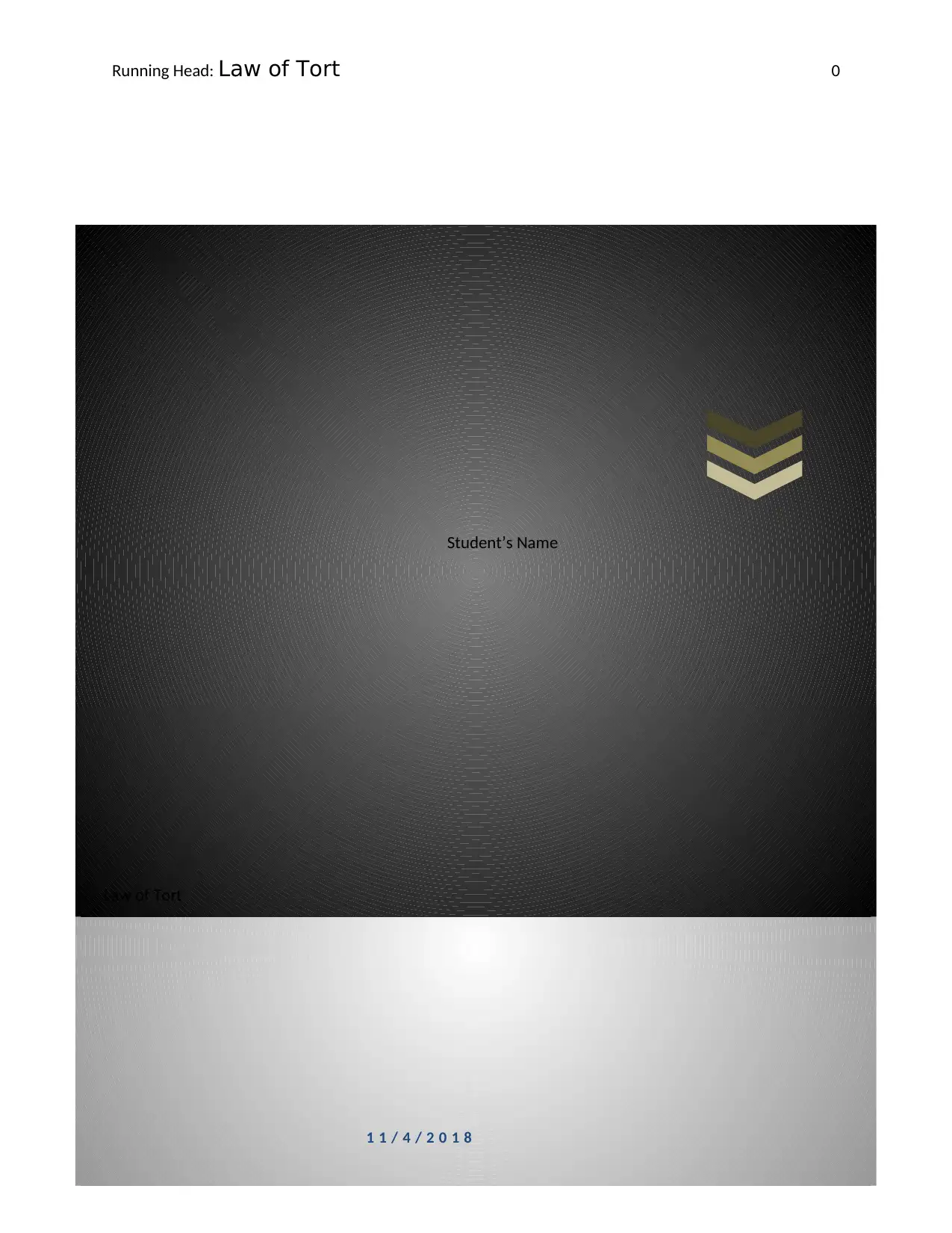
Law of Tort
Running Head: Law of Tort 0
1 1 / 4 / 2 0 1 8
Student’s Name
Running Head: Law of Tort 0
1 1 / 4 / 2 0 1 8
Student’s Name
Paraphrase This Document
Need a fresh take? Get an instant paraphrase of this document with our AI Paraphraser
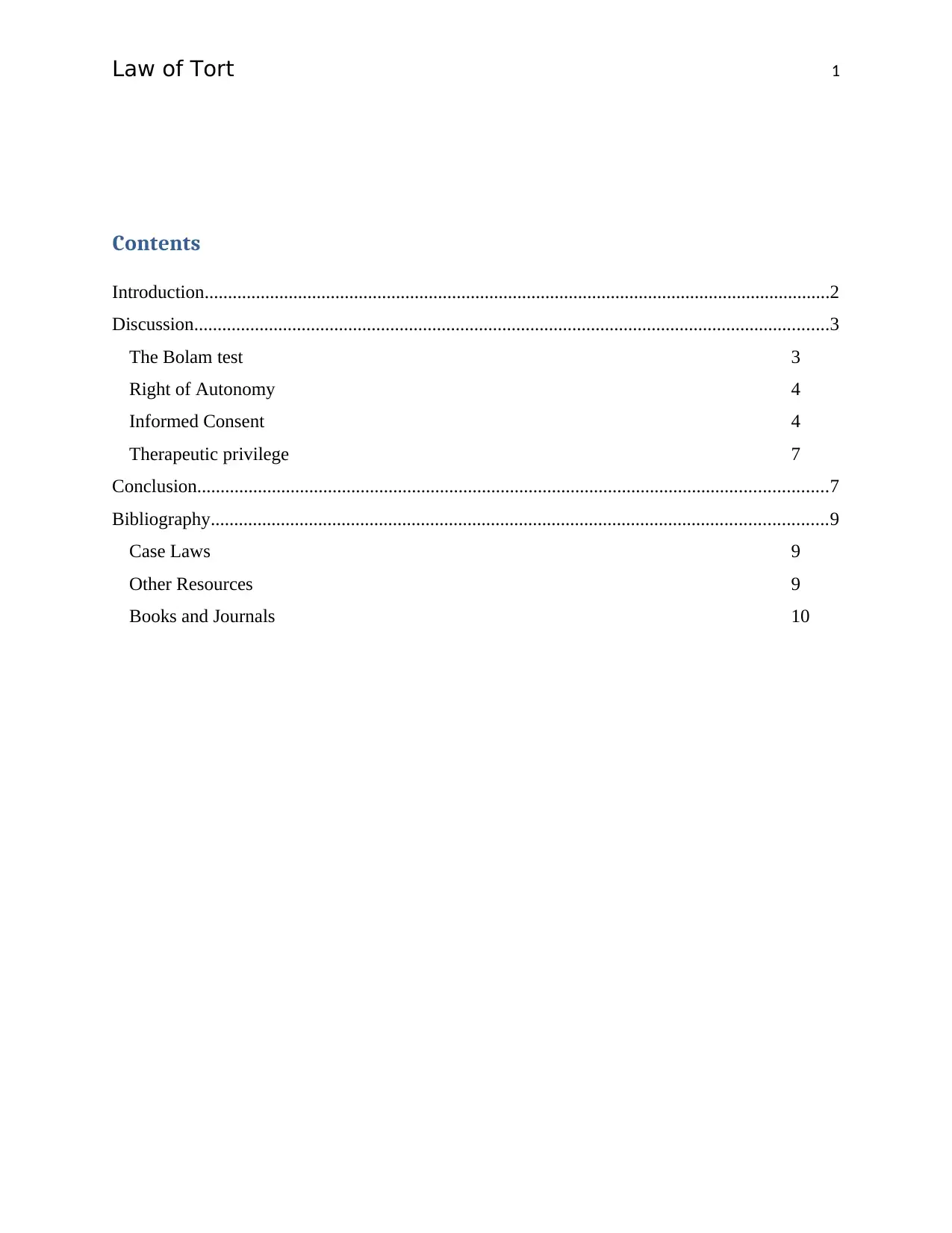
Law of Tort 1
Contents
Introduction......................................................................................................................................2
Discussion........................................................................................................................................3
The Bolam test 3
Right of Autonomy 4
Informed Consent 4
Therapeutic privilege 7
Conclusion.......................................................................................................................................7
Bibliography....................................................................................................................................9
Case Laws 9
Other Resources 9
Books and Journals 10
Contents
Introduction......................................................................................................................................2
Discussion........................................................................................................................................3
The Bolam test 3
Right of Autonomy 4
Informed Consent 4
Therapeutic privilege 7
Conclusion.......................................................................................................................................7
Bibliography....................................................................................................................................9
Case Laws 9
Other Resources 9
Books and Journals 10
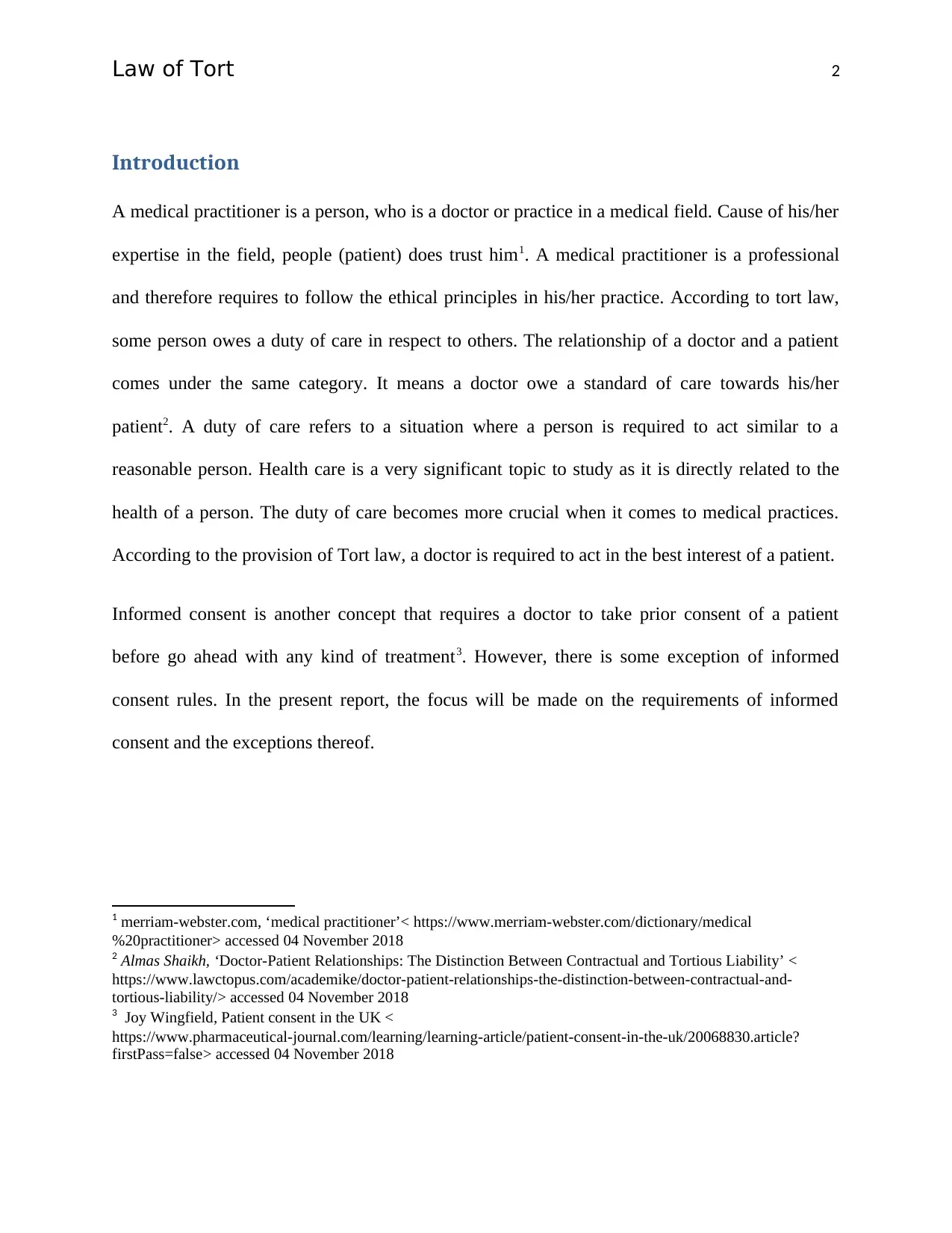
Law of Tort 2
Introduction
A medical practitioner is a person, who is a doctor or practice in a medical field. Cause of his/her
expertise in the field, people (patient) does trust him1. A medical practitioner is a professional
and therefore requires to follow the ethical principles in his/her practice. According to tort law,
some person owes a duty of care in respect to others. The relationship of a doctor and a patient
comes under the same category. It means a doctor owe a standard of care towards his/her
patient2. A duty of care refers to a situation where a person is required to act similar to a
reasonable person. Health care is a very significant topic to study as it is directly related to the
health of a person. The duty of care becomes more crucial when it comes to medical practices.
According to the provision of Tort law, a doctor is required to act in the best interest of a patient.
Informed consent is another concept that requires a doctor to take prior consent of a patient
before go ahead with any kind of treatment3. However, there is some exception of informed
consent rules. In the present report, the focus will be made on the requirements of informed
consent and the exceptions thereof.
1 merriam-webster.com, ‘medical practitioner’< https://www.merriam-webster.com/dictionary/medical
%20practitioner> accessed 04 November 2018
2 Almas Shaikh, ‘Doctor-Patient Relationships: The Distinction Between Contractual and Tortious Liability’ <
https://www.lawctopus.com/academike/doctor-patient-relationships-the-distinction-between-contractual-and-
tortious-liability/> accessed 04 November 2018
3 Joy Wingfield, Patient consent in the UK <
https://www.pharmaceutical-journal.com/learning/learning-article/patient-consent-in-the-uk/20068830.article?
firstPass=false> accessed 04 November 2018
Introduction
A medical practitioner is a person, who is a doctor or practice in a medical field. Cause of his/her
expertise in the field, people (patient) does trust him1. A medical practitioner is a professional
and therefore requires to follow the ethical principles in his/her practice. According to tort law,
some person owes a duty of care in respect to others. The relationship of a doctor and a patient
comes under the same category. It means a doctor owe a standard of care towards his/her
patient2. A duty of care refers to a situation where a person is required to act similar to a
reasonable person. Health care is a very significant topic to study as it is directly related to the
health of a person. The duty of care becomes more crucial when it comes to medical practices.
According to the provision of Tort law, a doctor is required to act in the best interest of a patient.
Informed consent is another concept that requires a doctor to take prior consent of a patient
before go ahead with any kind of treatment3. However, there is some exception of informed
consent rules. In the present report, the focus will be made on the requirements of informed
consent and the exceptions thereof.
1 merriam-webster.com, ‘medical practitioner’< https://www.merriam-webster.com/dictionary/medical
%20practitioner> accessed 04 November 2018
2 Almas Shaikh, ‘Doctor-Patient Relationships: The Distinction Between Contractual and Tortious Liability’ <
https://www.lawctopus.com/academike/doctor-patient-relationships-the-distinction-between-contractual-and-
tortious-liability/> accessed 04 November 2018
3 Joy Wingfield, Patient consent in the UK <
https://www.pharmaceutical-journal.com/learning/learning-article/patient-consent-in-the-uk/20068830.article?
firstPass=false> accessed 04 November 2018
⊘ This is a preview!⊘
Do you want full access?
Subscribe today to unlock all pages.

Trusted by 1+ million students worldwide
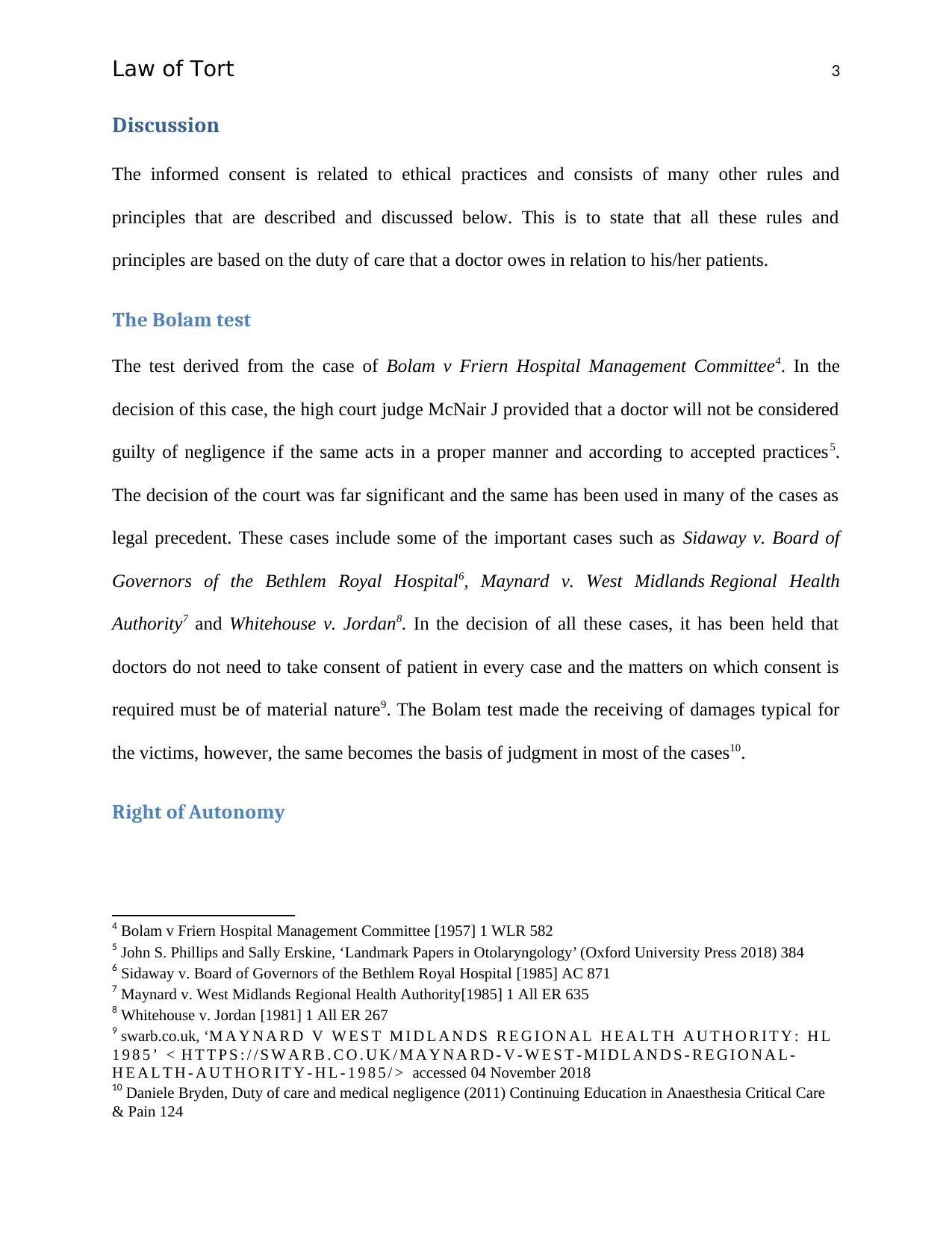
Law of Tort 3
Discussion
The informed consent is related to ethical practices and consists of many other rules and
principles that are described and discussed below. This is to state that all these rules and
principles are based on the duty of care that a doctor owes in relation to his/her patients.
The Bolam test
The test derived from the case of Bolam v Friern Hospital Management Committee4. In the
decision of this case, the high court judge McNair J provided that a doctor will not be considered
guilty of negligence if the same acts in a proper manner and according to accepted practices5.
The decision of the court was far significant and the same has been used in many of the cases as
legal precedent. These cases include some of the important cases such as Sidaway v. Board of
Governors of the Bethlem Royal Hospital6, Maynard v. West Midlands Regional Health
Authority7 and Whitehouse v. Jordan8. In the decision of all these cases, it has been held that
doctors do not need to take consent of patient in every case and the matters on which consent is
required must be of material nature9. The Bolam test made the receiving of damages typical for
the victims, however, the same becomes the basis of judgment in most of the cases10.
Right of Autonomy
4 Bolam v Friern Hospital Management Committee [1957] 1 WLR 582
5 John S. Phillips and Sally Erskine, ‘Landmark Papers in Otolaryngology’ (Oxford University Press 2018) 384
6 Sidaway v. Board of Governors of the Bethlem Royal Hospital [1985] AC 871
7 Maynard v. West Midlands Regional Health Authority[1985] 1 All ER 635
8 Whitehouse v. Jordan [1981] 1 All ER 267
9 swarb.co.uk, ‘M A Y N A R D V W E S T M I D L A N D S R E G I O N A L H E A L T H A U T H O R I T Y : H L
1 9 8 5 ’ < H T T P S : / / S W A R B . C O . U K / M A Y N A R D - V - W E S T - M I D L A N D S - R E G I O N A L -
H E A L T H - A U T H O R I T Y - H L - 1 9 8 5 / > accessed 04 November 2018
10 Daniele Bryden, Duty of care and medical negligence (2011) Continuing Education in Anaesthesia Critical Care
& Pain 124
Discussion
The informed consent is related to ethical practices and consists of many other rules and
principles that are described and discussed below. This is to state that all these rules and
principles are based on the duty of care that a doctor owes in relation to his/her patients.
The Bolam test
The test derived from the case of Bolam v Friern Hospital Management Committee4. In the
decision of this case, the high court judge McNair J provided that a doctor will not be considered
guilty of negligence if the same acts in a proper manner and according to accepted practices5.
The decision of the court was far significant and the same has been used in many of the cases as
legal precedent. These cases include some of the important cases such as Sidaway v. Board of
Governors of the Bethlem Royal Hospital6, Maynard v. West Midlands Regional Health
Authority7 and Whitehouse v. Jordan8. In the decision of all these cases, it has been held that
doctors do not need to take consent of patient in every case and the matters on which consent is
required must be of material nature9. The Bolam test made the receiving of damages typical for
the victims, however, the same becomes the basis of judgment in most of the cases10.
Right of Autonomy
4 Bolam v Friern Hospital Management Committee [1957] 1 WLR 582
5 John S. Phillips and Sally Erskine, ‘Landmark Papers in Otolaryngology’ (Oxford University Press 2018) 384
6 Sidaway v. Board of Governors of the Bethlem Royal Hospital [1985] AC 871
7 Maynard v. West Midlands Regional Health Authority[1985] 1 All ER 635
8 Whitehouse v. Jordan [1981] 1 All ER 267
9 swarb.co.uk, ‘M A Y N A R D V W E S T M I D L A N D S R E G I O N A L H E A L T H A U T H O R I T Y : H L
1 9 8 5 ’ < H T T P S : / / S W A R B . C O . U K / M A Y N A R D - V - W E S T - M I D L A N D S - R E G I O N A L -
H E A L T H - A U T H O R I T Y - H L - 1 9 8 5 / > accessed 04 November 2018
10 Daniele Bryden, Duty of care and medical negligence (2011) Continuing Education in Anaesthesia Critical Care
& Pain 124
Paraphrase This Document
Need a fresh take? Get an instant paraphrase of this document with our AI Paraphraser
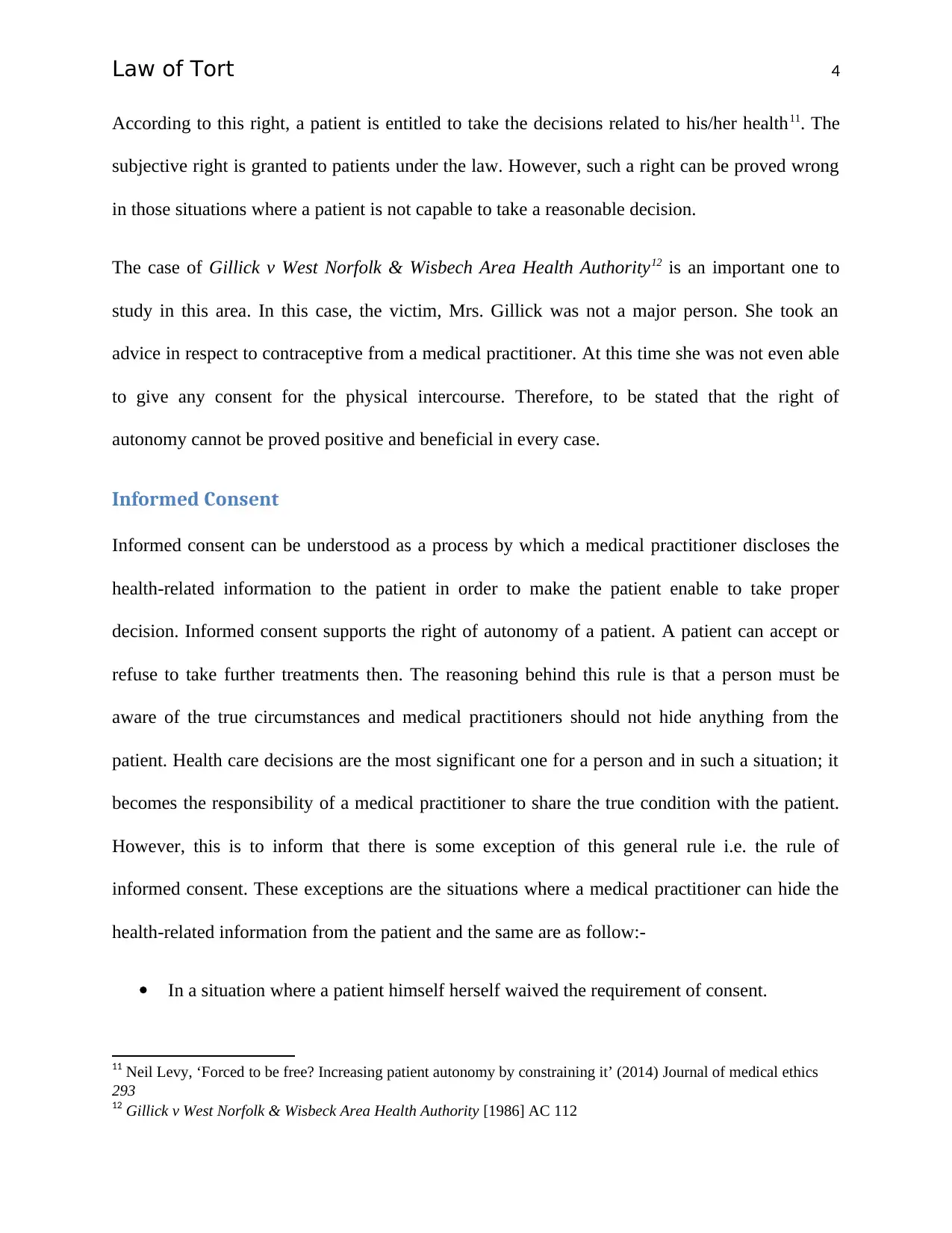
Law of Tort 4
According to this right, a patient is entitled to take the decisions related to his/her health11. The
subjective right is granted to patients under the law. However, such a right can be proved wrong
in those situations where a patient is not capable to take a reasonable decision.
The case of Gillick v West Norfolk & Wisbech Area Health Authority12 is an important one to
study in this area. In this case, the victim, Mrs. Gillick was not a major person. She took an
advice in respect to contraceptive from a medical practitioner. At this time she was not even able
to give any consent for the physical intercourse. Therefore, to be stated that the right of
autonomy cannot be proved positive and beneficial in every case.
Informed Consent
Informed consent can be understood as a process by which a medical practitioner discloses the
health-related information to the patient in order to make the patient enable to take proper
decision. Informed consent supports the right of autonomy of a patient. A patient can accept or
refuse to take further treatments then. The reasoning behind this rule is that a person must be
aware of the true circumstances and medical practitioners should not hide anything from the
patient. Health care decisions are the most significant one for a person and in such a situation; it
becomes the responsibility of a medical practitioner to share the true condition with the patient.
However, this is to inform that there is some exception of this general rule i.e. the rule of
informed consent. These exceptions are the situations where a medical practitioner can hide the
health-related information from the patient and the same are as follow:-
In a situation where a patient himself herself waived the requirement of consent.
11 Neil Levy, ‘Forced to be free? Increasing patient autonomy by constraining it’ (2014) Journal of medical ethics
293
12 Gillick v West Norfolk & Wisbeck Area Health Authority [1986] AC 112
According to this right, a patient is entitled to take the decisions related to his/her health11. The
subjective right is granted to patients under the law. However, such a right can be proved wrong
in those situations where a patient is not capable to take a reasonable decision.
The case of Gillick v West Norfolk & Wisbech Area Health Authority12 is an important one to
study in this area. In this case, the victim, Mrs. Gillick was not a major person. She took an
advice in respect to contraceptive from a medical practitioner. At this time she was not even able
to give any consent for the physical intercourse. Therefore, to be stated that the right of
autonomy cannot be proved positive and beneficial in every case.
Informed Consent
Informed consent can be understood as a process by which a medical practitioner discloses the
health-related information to the patient in order to make the patient enable to take proper
decision. Informed consent supports the right of autonomy of a patient. A patient can accept or
refuse to take further treatments then. The reasoning behind this rule is that a person must be
aware of the true circumstances and medical practitioners should not hide anything from the
patient. Health care decisions are the most significant one for a person and in such a situation; it
becomes the responsibility of a medical practitioner to share the true condition with the patient.
However, this is to inform that there is some exception of this general rule i.e. the rule of
informed consent. These exceptions are the situations where a medical practitioner can hide the
health-related information from the patient and the same are as follow:-
In a situation where a patient himself herself waived the requirement of consent.
11 Neil Levy, ‘Forced to be free? Increasing patient autonomy by constraining it’ (2014) Journal of medical ethics
293
12 Gillick v West Norfolk & Wisbeck Area Health Authority [1986] AC 112
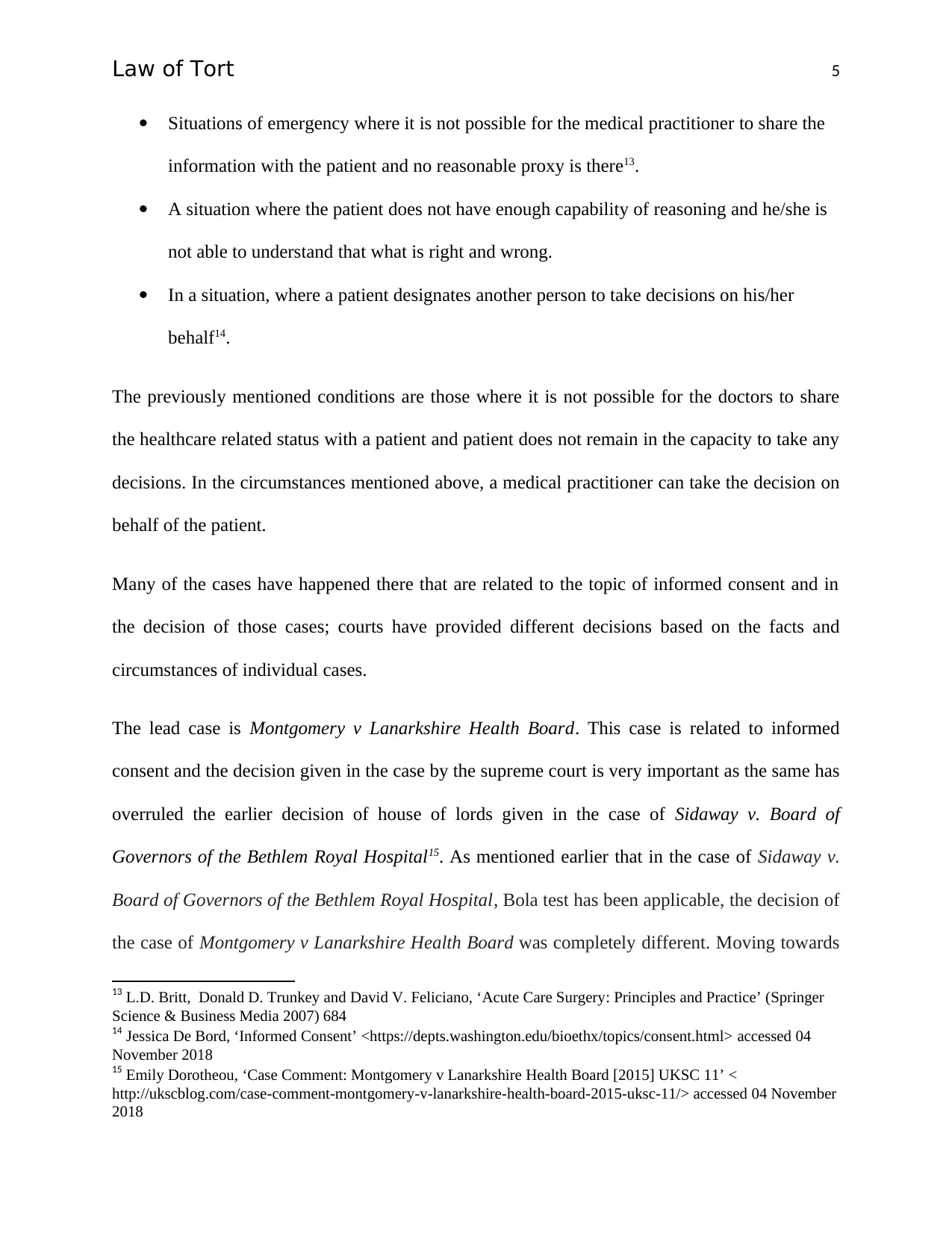
Law of Tort 5
Situations of emergency where it is not possible for the medical practitioner to share the
information with the patient and no reasonable proxy is there13.
A situation where the patient does not have enough capability of reasoning and he/she is
not able to understand that what is right and wrong.
In a situation, where a patient designates another person to take decisions on his/her
behalf14.
The previously mentioned conditions are those where it is not possible for the doctors to share
the healthcare related status with a patient and patient does not remain in the capacity to take any
decisions. In the circumstances mentioned above, a medical practitioner can take the decision on
behalf of the patient.
Many of the cases have happened there that are related to the topic of informed consent and in
the decision of those cases; courts have provided different decisions based on the facts and
circumstances of individual cases.
The lead case is Montgomery v Lanarkshire Health Board. This case is related to informed
consent and the decision given in the case by the supreme court is very important as the same has
overruled the earlier decision of house of lords given in the case of Sidaway v. Board of
Governors of the Bethlem Royal Hospital15. As mentioned earlier that in the case of Sidaway v.
Board of Governors of the Bethlem Royal Hospital, Bola test has been applicable, the decision of
the case of Montgomery v Lanarkshire Health Board was completely different. Moving towards
13 L.D. Britt, Donald D. Trunkey and David V. Feliciano, ‘Acute Care Surgery: Principles and Practice’ (Springer
Science & Business Media 2007) 684
14 Jessica De Bord, ‘Informed Consent’ <https://depts.washington.edu/bioethx/topics/consent.html> accessed 04
November 2018
15 Emily Dorotheou, ‘Case Comment: Montgomery v Lanarkshire Health Board [2015] UKSC 11’ <
http://ukscblog.com/case-comment-montgomery-v-lanarkshire-health-board-2015-uksc-11/> accessed 04 November
2018
Situations of emergency where it is not possible for the medical practitioner to share the
information with the patient and no reasonable proxy is there13.
A situation where the patient does not have enough capability of reasoning and he/she is
not able to understand that what is right and wrong.
In a situation, where a patient designates another person to take decisions on his/her
behalf14.
The previously mentioned conditions are those where it is not possible for the doctors to share
the healthcare related status with a patient and patient does not remain in the capacity to take any
decisions. In the circumstances mentioned above, a medical practitioner can take the decision on
behalf of the patient.
Many of the cases have happened there that are related to the topic of informed consent and in
the decision of those cases; courts have provided different decisions based on the facts and
circumstances of individual cases.
The lead case is Montgomery v Lanarkshire Health Board. This case is related to informed
consent and the decision given in the case by the supreme court is very important as the same has
overruled the earlier decision of house of lords given in the case of Sidaway v. Board of
Governors of the Bethlem Royal Hospital15. As mentioned earlier that in the case of Sidaway v.
Board of Governors of the Bethlem Royal Hospital, Bola test has been applicable, the decision of
the case of Montgomery v Lanarkshire Health Board was completely different. Moving towards
13 L.D. Britt, Donald D. Trunkey and David V. Feliciano, ‘Acute Care Surgery: Principles and Practice’ (Springer
Science & Business Media 2007) 684
14 Jessica De Bord, ‘Informed Consent’ <https://depts.washington.edu/bioethx/topics/consent.html> accessed 04
November 2018
15 Emily Dorotheou, ‘Case Comment: Montgomery v Lanarkshire Health Board [2015] UKSC 11’ <
http://ukscblog.com/case-comment-montgomery-v-lanarkshire-health-board-2015-uksc-11/> accessed 04 November
2018
⊘ This is a preview!⊘
Do you want full access?
Subscribe today to unlock all pages.

Trusted by 1+ million students worldwide
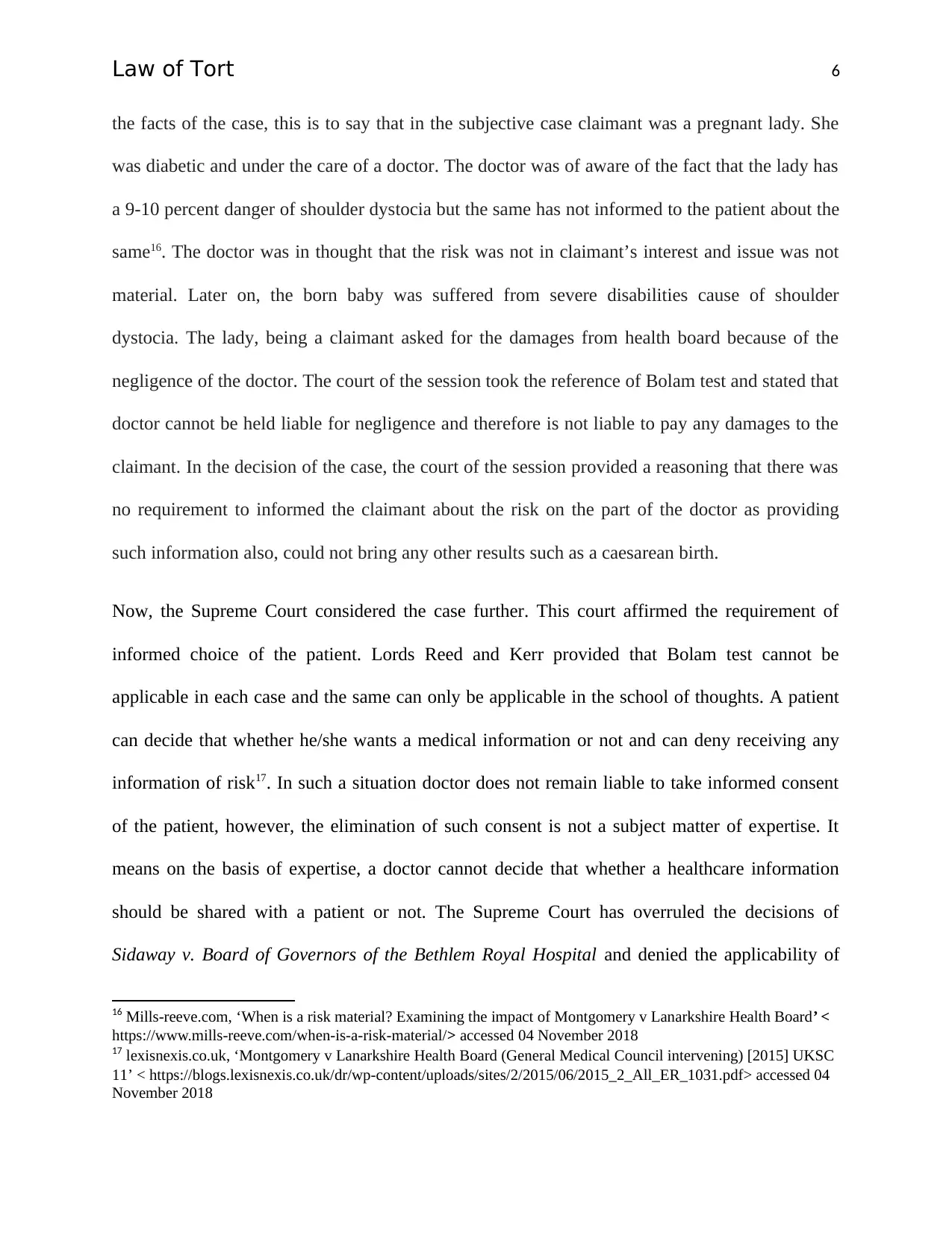
Law of Tort 6
the facts of the case, this is to say that in the subjective case claimant was a pregnant lady. She
was diabetic and under the care of a doctor. The doctor was of aware of the fact that the lady has
a 9-10 percent danger of shoulder dystocia but the same has not informed to the patient about the
same16. The doctor was in thought that the risk was not in claimant’s interest and issue was not
material. Later on, the born baby was suffered from severe disabilities cause of shoulder
dystocia. The lady, being a claimant asked for the damages from health board because of the
negligence of the doctor. The court of the session took the reference of Bolam test and stated that
doctor cannot be held liable for negligence and therefore is not liable to pay any damages to the
claimant. In the decision of the case, the court of the session provided a reasoning that there was
no requirement to informed the claimant about the risk on the part of the doctor as providing
such information also, could not bring any other results such as a caesarean birth.
Now, the Supreme Court considered the case further. This court affirmed the requirement of
informed choice of the patient. Lords Reed and Kerr provided that Bolam test cannot be
applicable in each case and the same can only be applicable in the school of thoughts. A patient
can decide that whether he/she wants a medical information or not and can deny receiving any
information of risk17. In such a situation doctor does not remain liable to take informed consent
of the patient, however, the elimination of such consent is not a subject matter of expertise. It
means on the basis of expertise, a doctor cannot decide that whether a healthcare information
should be shared with a patient or not. The Supreme Court has overruled the decisions of
Sidaway v. Board of Governors of the Bethlem Royal Hospital and denied the applicability of
16 Mills-reeve.com, ‘When is a risk material? Examining the impact of Montgomery v Lanarkshire Health Board’ <
https://www.mills-reeve.com/when-is-a-risk-material/> accessed 04 November 2018
17 lexisnexis.co.uk, ‘Montgomery v Lanarkshire Health Board (General Medical Council intervening) [2015] UKSC
11’ < https://blogs.lexisnexis.co.uk/dr/wp-content/uploads/sites/2/2015/06/2015_2_All_ER_1031.pdf> accessed 04
November 2018
the facts of the case, this is to say that in the subjective case claimant was a pregnant lady. She
was diabetic and under the care of a doctor. The doctor was of aware of the fact that the lady has
a 9-10 percent danger of shoulder dystocia but the same has not informed to the patient about the
same16. The doctor was in thought that the risk was not in claimant’s interest and issue was not
material. Later on, the born baby was suffered from severe disabilities cause of shoulder
dystocia. The lady, being a claimant asked for the damages from health board because of the
negligence of the doctor. The court of the session took the reference of Bolam test and stated that
doctor cannot be held liable for negligence and therefore is not liable to pay any damages to the
claimant. In the decision of the case, the court of the session provided a reasoning that there was
no requirement to informed the claimant about the risk on the part of the doctor as providing
such information also, could not bring any other results such as a caesarean birth.
Now, the Supreme Court considered the case further. This court affirmed the requirement of
informed choice of the patient. Lords Reed and Kerr provided that Bolam test cannot be
applicable in each case and the same can only be applicable in the school of thoughts. A patient
can decide that whether he/she wants a medical information or not and can deny receiving any
information of risk17. In such a situation doctor does not remain liable to take informed consent
of the patient, however, the elimination of such consent is not a subject matter of expertise. It
means on the basis of expertise, a doctor cannot decide that whether a healthcare information
should be shared with a patient or not. The Supreme Court has overruled the decisions of
Sidaway v. Board of Governors of the Bethlem Royal Hospital and denied the applicability of
16 Mills-reeve.com, ‘When is a risk material? Examining the impact of Montgomery v Lanarkshire Health Board’ <
https://www.mills-reeve.com/when-is-a-risk-material/> accessed 04 November 2018
17 lexisnexis.co.uk, ‘Montgomery v Lanarkshire Health Board (General Medical Council intervening) [2015] UKSC
11’ < https://blogs.lexisnexis.co.uk/dr/wp-content/uploads/sites/2/2015/06/2015_2_All_ER_1031.pdf> accessed 04
November 2018
Paraphrase This Document
Need a fresh take? Get an instant paraphrase of this document with our AI Paraphraser
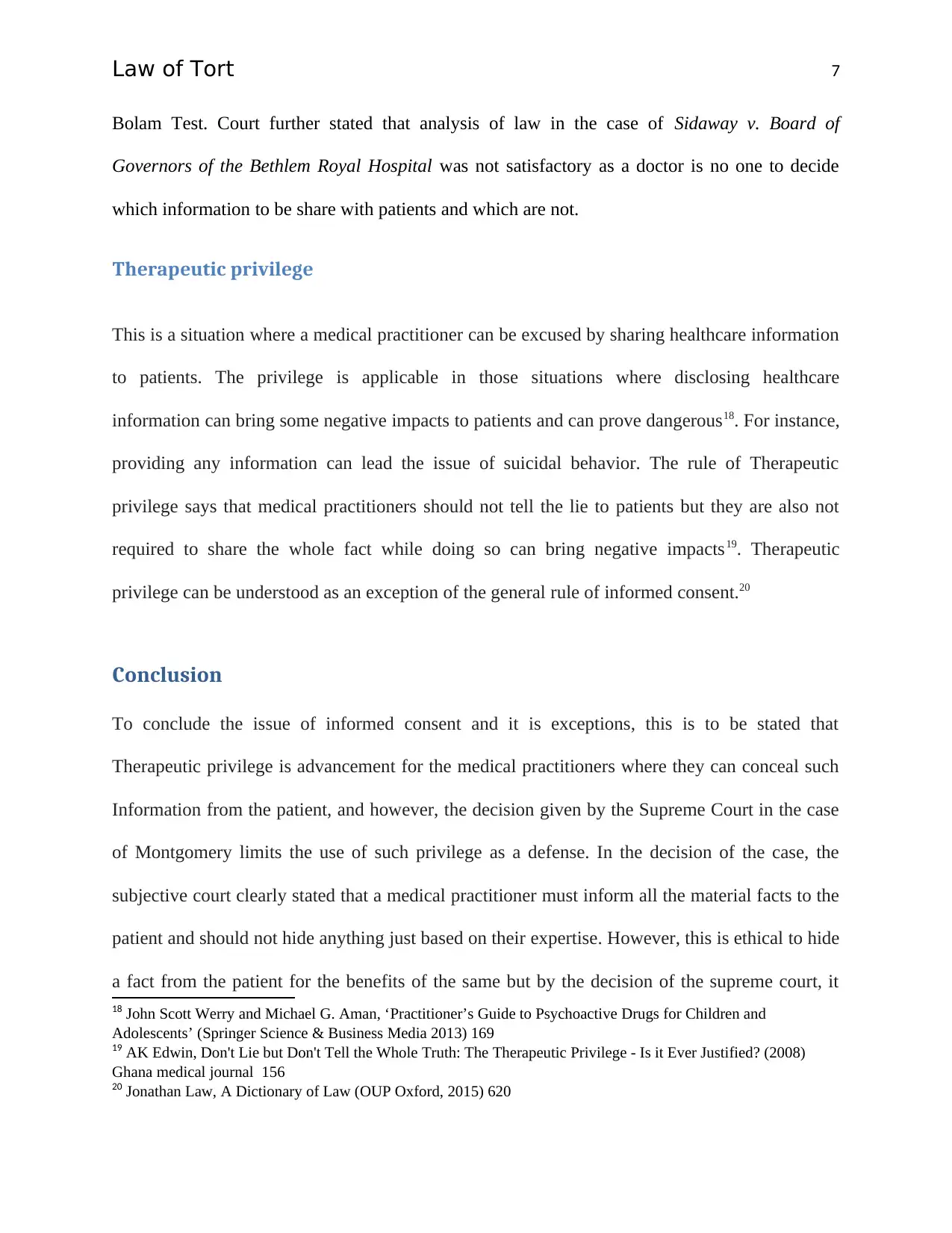
Law of Tort 7
Bolam Test. Court further stated that analysis of law in the case of Sidaway v. Board of
Governors of the Bethlem Royal Hospital was not satisfactory as a doctor is no one to decide
which information to be share with patients and which are not.
Therapeutic privilege
This is a situation where a medical practitioner can be excused by sharing healthcare information
to patients. The privilege is applicable in those situations where disclosing healthcare
information can bring some negative impacts to patients and can prove dangerous18. For instance,
providing any information can lead the issue of suicidal behavior. The rule of Therapeutic
privilege says that medical practitioners should not tell the lie to patients but they are also not
required to share the whole fact while doing so can bring negative impacts19. Therapeutic
privilege can be understood as an exception of the general rule of informed consent.20
Conclusion
To conclude the issue of informed consent and it is exceptions, this is to be stated that
Therapeutic privilege is advancement for the medical practitioners where they can conceal such
Information from the patient, and however, the decision given by the Supreme Court in the case
of Montgomery limits the use of such privilege as a defense. In the decision of the case, the
subjective court clearly stated that a medical practitioner must inform all the material facts to the
patient and should not hide anything just based on their expertise. However, this is ethical to hide
a fact from the patient for the benefits of the same but by the decision of the supreme court, it
18 John Scott Werry and Michael G. Aman, ‘Practitioner’s Guide to Psychoactive Drugs for Children and
Adolescents’ (Springer Science & Business Media 2013) 169
19 AK Edwin, Don't Lie but Don't Tell the Whole Truth: The Therapeutic Privilege - Is it Ever Justified? (2008)
Ghana medical journal 156
20 Jonathan Law, A Dictionary of Law (OUP Oxford, 2015) 620
Bolam Test. Court further stated that analysis of law in the case of Sidaway v. Board of
Governors of the Bethlem Royal Hospital was not satisfactory as a doctor is no one to decide
which information to be share with patients and which are not.
Therapeutic privilege
This is a situation where a medical practitioner can be excused by sharing healthcare information
to patients. The privilege is applicable in those situations where disclosing healthcare
information can bring some negative impacts to patients and can prove dangerous18. For instance,
providing any information can lead the issue of suicidal behavior. The rule of Therapeutic
privilege says that medical practitioners should not tell the lie to patients but they are also not
required to share the whole fact while doing so can bring negative impacts19. Therapeutic
privilege can be understood as an exception of the general rule of informed consent.20
Conclusion
To conclude the issue of informed consent and it is exceptions, this is to be stated that
Therapeutic privilege is advancement for the medical practitioners where they can conceal such
Information from the patient, and however, the decision given by the Supreme Court in the case
of Montgomery limits the use of such privilege as a defense. In the decision of the case, the
subjective court clearly stated that a medical practitioner must inform all the material facts to the
patient and should not hide anything just based on their expertise. However, this is ethical to hide
a fact from the patient for the benefits of the same but by the decision of the supreme court, it
18 John Scott Werry and Michael G. Aman, ‘Practitioner’s Guide to Psychoactive Drugs for Children and
Adolescents’ (Springer Science & Business Media 2013) 169
19 AK Edwin, Don't Lie but Don't Tell the Whole Truth: The Therapeutic Privilege - Is it Ever Justified? (2008)
Ghana medical journal 156
20 Jonathan Law, A Dictionary of Law (OUP Oxford, 2015) 620
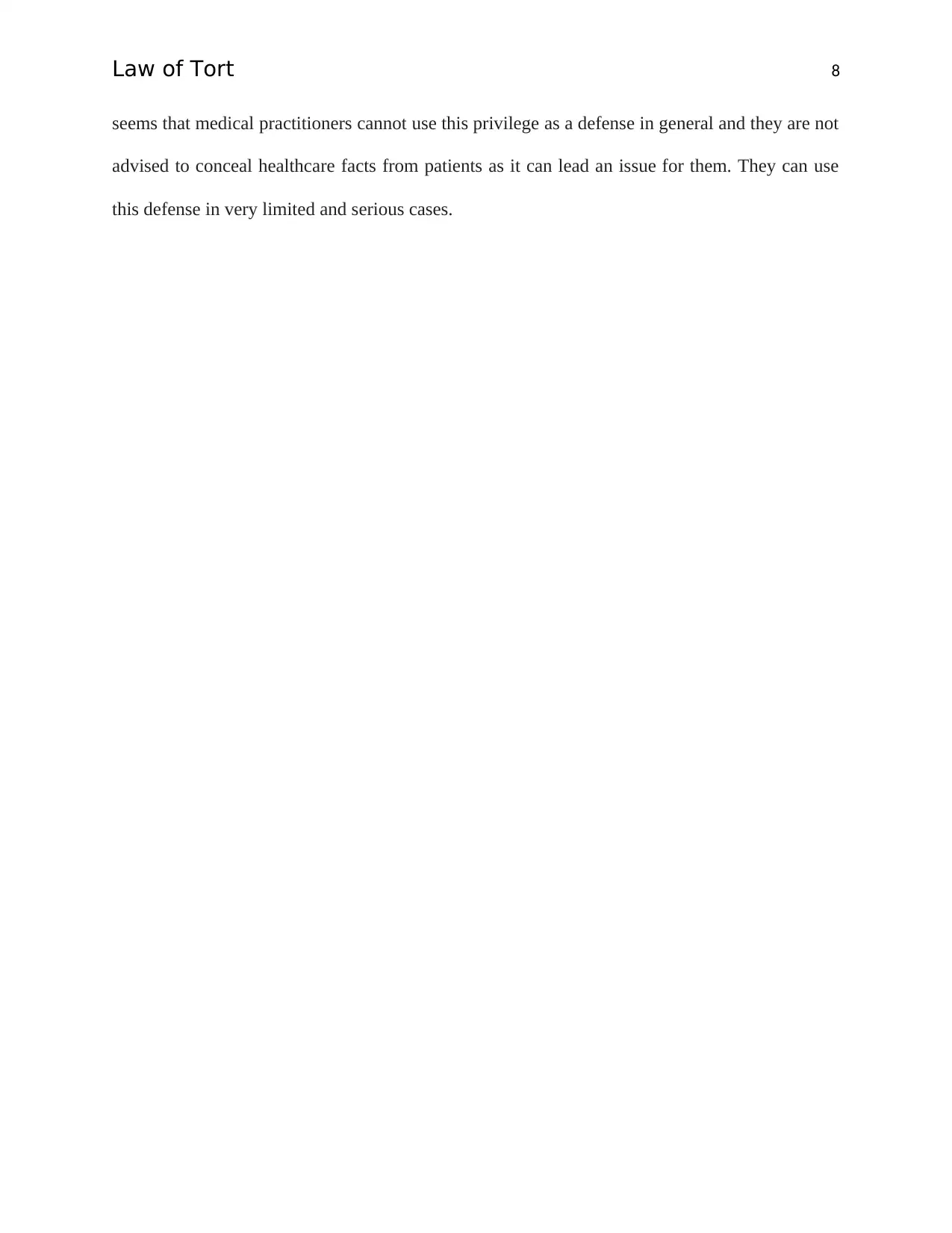
Law of Tort 8
seems that medical practitioners cannot use this privilege as a defense in general and they are not
advised to conceal healthcare facts from patients as it can lead an issue for them. They can use
this defense in very limited and serious cases.
seems that medical practitioners cannot use this privilege as a defense in general and they are not
advised to conceal healthcare facts from patients as it can lead an issue for them. They can use
this defense in very limited and serious cases.
⊘ This is a preview!⊘
Do you want full access?
Subscribe today to unlock all pages.

Trusted by 1+ million students worldwide
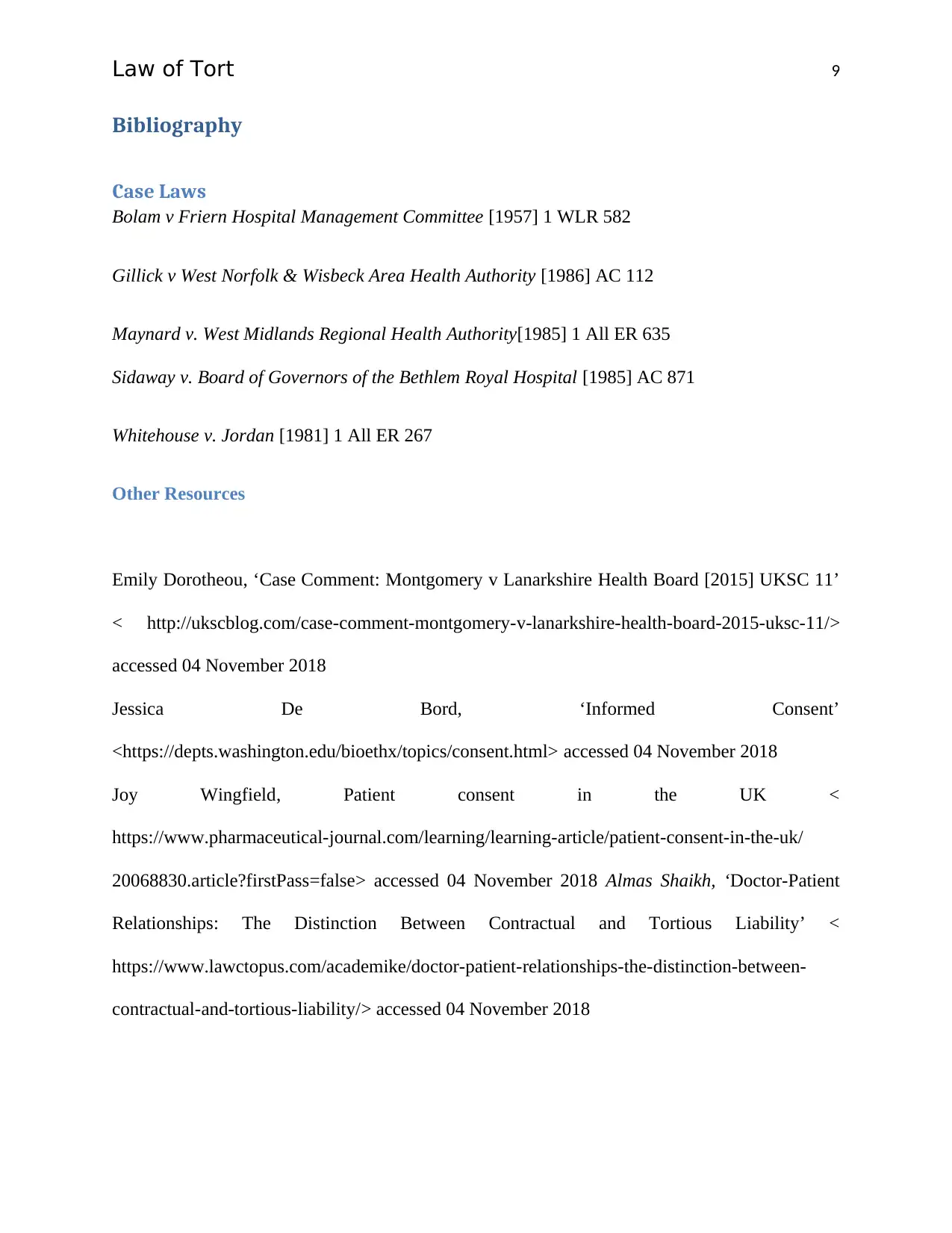
Law of Tort 9
Bibliography
Case Laws
Bolam v Friern Hospital Management Committee [1957] 1 WLR 582
Gillick v West Norfolk & Wisbeck Area Health Authority [1986] AC 112
Maynard v. West Midlands Regional Health Authority[1985] 1 All ER 635
Sidaway v. Board of Governors of the Bethlem Royal Hospital [1985] AC 871
Whitehouse v. Jordan [1981] 1 All ER 267
Other Resources
Emily Dorotheou, ‘Case Comment: Montgomery v Lanarkshire Health Board [2015] UKSC 11’
< http://ukscblog.com/case-comment-montgomery-v-lanarkshire-health-board-2015-uksc-11/>
accessed 04 November 2018
Jessica De Bord, ‘Informed Consent’
<https://depts.washington.edu/bioethx/topics/consent.html> accessed 04 November 2018
Joy Wingfield, Patient consent in the UK <
https://www.pharmaceutical-journal.com/learning/learning-article/patient-consent-in-the-uk/
20068830.article?firstPass=false> accessed 04 November 2018 Almas Shaikh, ‘Doctor-Patient
Relationships: The Distinction Between Contractual and Tortious Liability’ <
https://www.lawctopus.com/academike/doctor-patient-relationships-the-distinction-between-
contractual-and-tortious-liability/> accessed 04 November 2018
Bibliography
Case Laws
Bolam v Friern Hospital Management Committee [1957] 1 WLR 582
Gillick v West Norfolk & Wisbeck Area Health Authority [1986] AC 112
Maynard v. West Midlands Regional Health Authority[1985] 1 All ER 635
Sidaway v. Board of Governors of the Bethlem Royal Hospital [1985] AC 871
Whitehouse v. Jordan [1981] 1 All ER 267
Other Resources
Emily Dorotheou, ‘Case Comment: Montgomery v Lanarkshire Health Board [2015] UKSC 11’
< http://ukscblog.com/case-comment-montgomery-v-lanarkshire-health-board-2015-uksc-11/>
accessed 04 November 2018
Jessica De Bord, ‘Informed Consent’
<https://depts.washington.edu/bioethx/topics/consent.html> accessed 04 November 2018
Joy Wingfield, Patient consent in the UK <
https://www.pharmaceutical-journal.com/learning/learning-article/patient-consent-in-the-uk/
20068830.article?firstPass=false> accessed 04 November 2018 Almas Shaikh, ‘Doctor-Patient
Relationships: The Distinction Between Contractual and Tortious Liability’ <
https://www.lawctopus.com/academike/doctor-patient-relationships-the-distinction-between-
contractual-and-tortious-liability/> accessed 04 November 2018
Paraphrase This Document
Need a fresh take? Get an instant paraphrase of this document with our AI Paraphraser
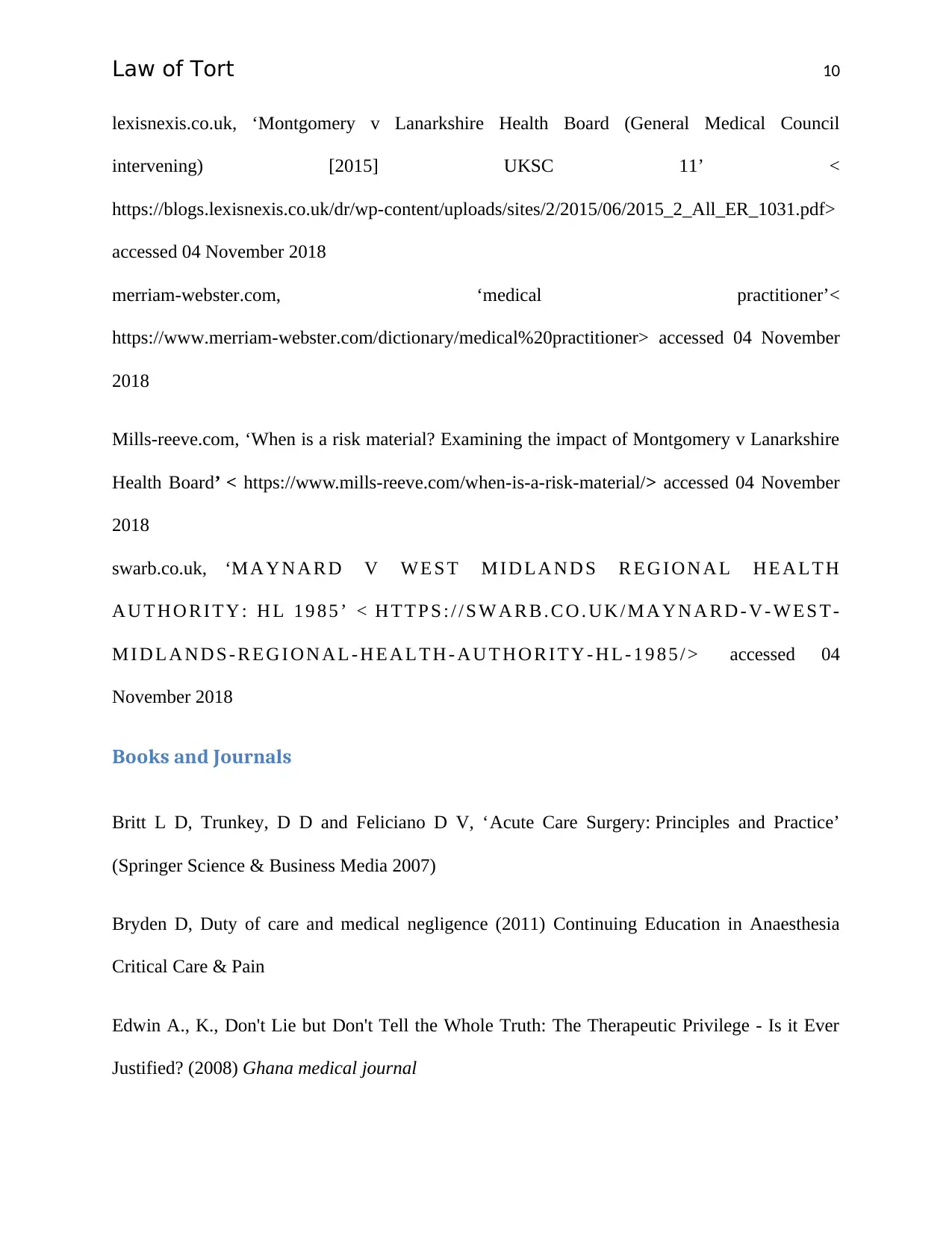
Law of Tort 10
lexisnexis.co.uk, ‘Montgomery v Lanarkshire Health Board (General Medical Council
intervening) [2015] UKSC 11’ <
https://blogs.lexisnexis.co.uk/dr/wp-content/uploads/sites/2/2015/06/2015_2_All_ER_1031.pdf>
accessed 04 November 2018
merriam-webster.com, ‘medical practitioner’<
https://www.merriam-webster.com/dictionary/medical%20practitioner> accessed 04 November
2018
Mills-reeve.com, ‘When is a risk material? Examining the impact of Montgomery v Lanarkshire
Health Board’ < https://www.mills-reeve.com/when-is-a-risk-material/> accessed 04 November
2018
swarb.co.uk, ‘M A Y N A R D V W E S T M I D L A N D S R E G I O N A L H E A L T H
A U T H O R I T Y : H L 1 9 8 5 ’ < H T T P S : / / S W A R B . C O . U K / M A Y N A R D - V - W E S T -
M I D L A N D S - R E G I O N A L - H E A L T H - A U T H O R I T Y - H L - 1 9 8 5 / > accessed 04
November 2018
Books and Journals
Britt L D, Trunkey, D D and Feliciano D V, ‘Acute Care Surgery: Principles and Practice’
(Springer Science & Business Media 2007)
Bryden D, Duty of care and medical negligence (2011) Continuing Education in Anaesthesia
Critical Care & Pain
Edwin A., K., Don't Lie but Don't Tell the Whole Truth: The Therapeutic Privilege - Is it Ever
Justified? (2008) Ghana medical journal
lexisnexis.co.uk, ‘Montgomery v Lanarkshire Health Board (General Medical Council
intervening) [2015] UKSC 11’ <
https://blogs.lexisnexis.co.uk/dr/wp-content/uploads/sites/2/2015/06/2015_2_All_ER_1031.pdf>
accessed 04 November 2018
merriam-webster.com, ‘medical practitioner’<
https://www.merriam-webster.com/dictionary/medical%20practitioner> accessed 04 November
2018
Mills-reeve.com, ‘When is a risk material? Examining the impact of Montgomery v Lanarkshire
Health Board’ < https://www.mills-reeve.com/when-is-a-risk-material/> accessed 04 November
2018
swarb.co.uk, ‘M A Y N A R D V W E S T M I D L A N D S R E G I O N A L H E A L T H
A U T H O R I T Y : H L 1 9 8 5 ’ < H T T P S : / / S W A R B . C O . U K / M A Y N A R D - V - W E S T -
M I D L A N D S - R E G I O N A L - H E A L T H - A U T H O R I T Y - H L - 1 9 8 5 / > accessed 04
November 2018
Books and Journals
Britt L D, Trunkey, D D and Feliciano D V, ‘Acute Care Surgery: Principles and Practice’
(Springer Science & Business Media 2007)
Bryden D, Duty of care and medical negligence (2011) Continuing Education in Anaesthesia
Critical Care & Pain
Edwin A., K., Don't Lie but Don't Tell the Whole Truth: The Therapeutic Privilege - Is it Ever
Justified? (2008) Ghana medical journal
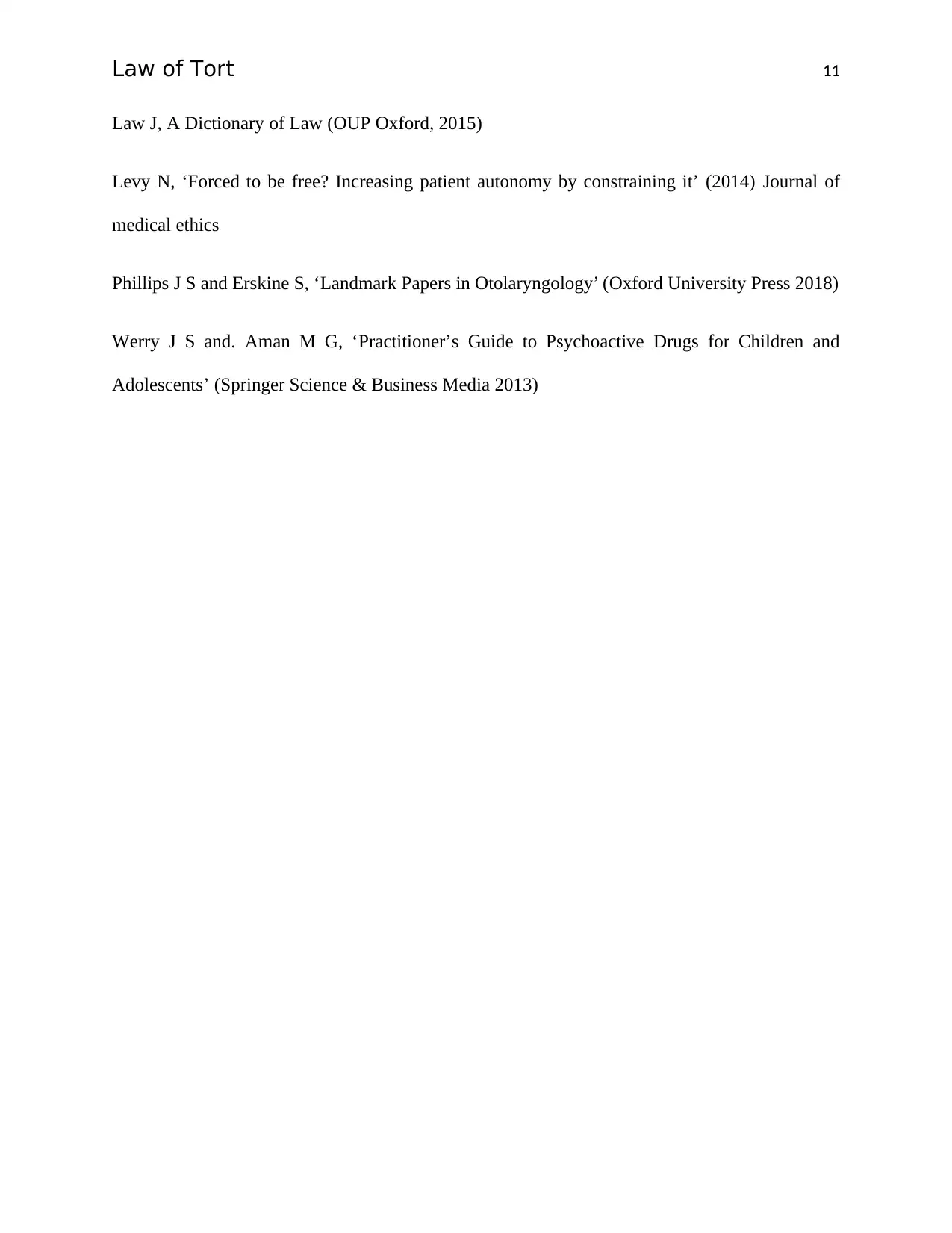
Law of Tort 11
Law J, A Dictionary of Law (OUP Oxford, 2015)
Levy N, ‘Forced to be free? Increasing patient autonomy by constraining it’ (2014) Journal of
medical ethics
Phillips J S and Erskine S, ‘Landmark Papers in Otolaryngology’ (Oxford University Press 2018)
Werry J S and. Aman M G, ‘Practitioner’s Guide to Psychoactive Drugs for Children and
Adolescents’ (Springer Science & Business Media 2013)
Law J, A Dictionary of Law (OUP Oxford, 2015)
Levy N, ‘Forced to be free? Increasing patient autonomy by constraining it’ (2014) Journal of
medical ethics
Phillips J S and Erskine S, ‘Landmark Papers in Otolaryngology’ (Oxford University Press 2018)
Werry J S and. Aman M G, ‘Practitioner’s Guide to Psychoactive Drugs for Children and
Adolescents’ (Springer Science & Business Media 2013)
⊘ This is a preview!⊘
Do you want full access?
Subscribe today to unlock all pages.

Trusted by 1+ million students worldwide
1 out of 12
Related Documents
Your All-in-One AI-Powered Toolkit for Academic Success.
+13062052269
info@desklib.com
Available 24*7 on WhatsApp / Email
![[object Object]](/_next/static/media/star-bottom.7253800d.svg)
Unlock your academic potential
Copyright © 2020–2026 A2Z Services. All Rights Reserved. Developed and managed by ZUCOL.





